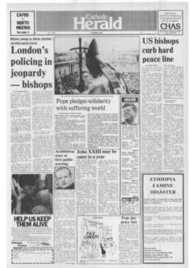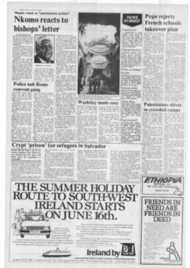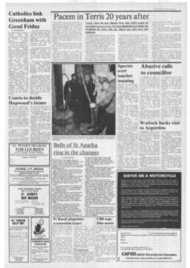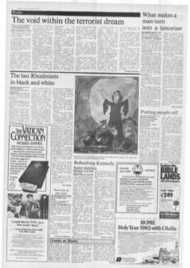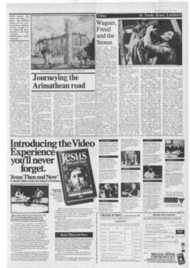Page 1, 8th April 1983
Page 1
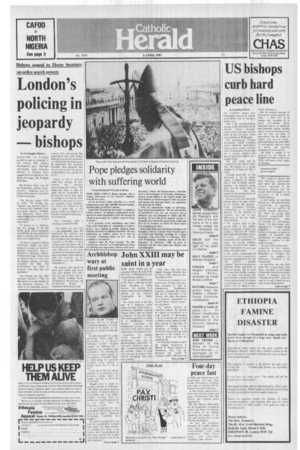
Report an error
Noticed an error on this page?If you've noticed an error in this article please click here to report it.
Tags
Share
Related articles
Disarming Bishop Meets Cardinal Hume In London
Us Bishops Make Peace Line Tougher
How Us Bishops Amended Their Pastoral On Peace
National Nuclear Policy Fails To Match Up To Catholic...
How Us Bishops Changed Their Minds On The Bomb
Us bishops curb hard peace line
by Jonathan Petrie NO NATION should ever contemplate taking the morally unjustifiable step of starting a nuclear war.
This is the uncompromising message of the third draft of the United States bishops' controversial proposed pastoral letter on war and peace, which was published on Wednesday.
The hard-hitting 178-page document, which contains several significant moderations from previous drafts, reaffirms total condemnation of any first use of nuclear weapons, but moves away from support for a nuclear freeze.
The new draft will be considered by the nation's more than 300 bishops at a special meeting in Chicago on May 2 and 3.
Though approval of the document is by no means certain, a majority of bishops said at their November general meeting — at which the second draft was the major topic of discussion — that they supported the general thrust of the proposed pastoral.
Because of that the third draft follows almost the same outline as the second. But pressure from European bishops, culminating in a top-level meeting in the Vatican in January, has led to key differences in the new draft. These include: • The support given in the second draft to the nuclear freeze movement is given less emphasis. Whereas the second draft urged the immediate end to further development, production and deployment of major new nuclear weapons systems, the third draft simply urges negotiations to curb such testing and deployment.
• The section condemning all first use of nuclear weapons now includes recognition of the role that NATO's "flexible response" doctrine has played in deterring Soviet aggression in Western Europe. But the draft also urges that flexible response — the policy that permits first use of nuclear weapons if NATO forces seem in danger of losing a conventional war — be replaced quickly with an adequate non nuclear alternative.
But the essential message of the previous drafts remains the same — a firm "no" to all nuclear war; rejections of or grave reservations about important aspects of American and European nuclear defence policy; stress on the requirement that not only the goals of government but the means to achieve them must be moral ; and urgent pleas for a new order of international relations based on justice and peaceful resolution of world conflict.
The draft is certain to be discussed by the bishops of England and Wales at their Low Week conference which begins on Monday.
Greenhorn action pictures page 8 They should be pleased that their American counterparts have taken into account the concern expressed by the European bishops over the second draft's lanugage on the possibility of the so-called flexible response.
In both drafts the American bishops say: "We find the moral responsibility of beginning nuclear war not justified by rational political objectives." But where the second draft declared categorically that "non-nuclear attacks . must be resisted by non-nuclear means," the third speaks more cautiously of "a serious moral obligation . to develop defensive strategies as rapidly as possible to preclude any justification for using nuclear weapons in response to nonnuclear attacks."
The new draft, written by a committee of five bishops headed by Cardinal Joseph Bernardin of Chicago, also expands the analysis of deterrence contained in the second draft.
In particular, the new draft takes into account Pope John Paul's statement to the United Nations last June that deterrence based on balance may be "morally acceptable" when not used as an end in itself but as a step towards disarmament.
Turn to page 9
blog comments powered by Disqus


